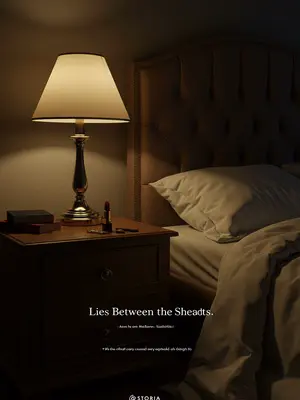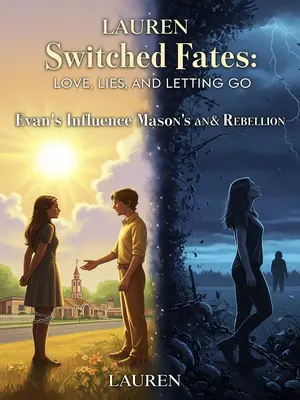Chapter 3: The Mansion’s Silent Games
When I first moved into the Carmichael house, I was on my best behavior—smiling, polite, invisible. That long summer break, I mapped out every inch of the place.
I wandered through the rooms, memorizing the way the late-afternoon sun slanted across the banister, the creak in the third step, the echo of my footsteps in the upstairs hall. It was a palace and a prison at the same time.
The first time I greeted Julian, he barely glanced at me before walking away, not coming home that night.
He brushed past me, his backpack slung carelessly over one shoulder, leaving a trail of chilly silence in his wake.
Later, Linda was so furious she shattered a mug in the living room, shards scattering across the Persian rug. "Ungrateful brat!" she spat, her voice echoing through the halls.
The crash rang out, but I just knelt down to help, my hands steady as I gathered the pieces.
I pretended not to notice the tension, smiling as I handed Linda the broken porcelain. "Auntie, don’t be upset. Maybe Julian just needs time. I’ll keep my distance."
I kept my voice light, my hands steady even as I picked up the sharpest shards, hiding the sting in my palm.
She eyed me coldly as I cleaned up, then snapped, "Leave it. Mrs. Greene will handle it. You go to the same college as him—if you see him on campus, ignore him."
Her gaze was sharp, demanding obedience, not drama. I gave her the performance she wanted.
A shard slipped, slicing a thin red line across my palm.
I watched the blood bead up—bright and neat. I didn’t even flinch.
I sucked it up, still smiling. "Okay, Auntie. I get it."
That night, Linda took Dennis to a charity dinner, and after Mrs. Greene left, I finally had the house to myself.
The silence pressed in, thick and heavy. The kitchen felt cavernous, the TV in the den still tuned to the local news, the faint scent of popcorn lingering in the air.
At 11 p.m., hunger won out and I tiptoed downstairs to grab the leftover Portillo’s chocolate cake from the fridge.
The marble tiles were freezing under my feet. I moved quietly, not wanting to break the fragile hush.
As I crouched to open the fridge, a scraping noise echoed from the living room.
My heart thudded, nerves prickling. In the emptiness, the sound felt deafening.
I froze, then a can of Coke rolled off the fridge door and clattered to the floor.
I winced, mentally cursing my luck and the sudden spike of adrenaline.
The scraping stopped instantly.
The silence that followed was even worse, like the house itself was holding its breath.
I curled my toes, anxiety fluttering in my stomach, and held my breath.
Footsteps approached, and a tall shadow filled the kitchen doorway, blocking out the light.
The hallway bulb flickered, casting his face in half-shadow. I caught a whiff of his cologne—something clean, almost minty.
I squeezed my eyes shut, lips pressed together, bracing myself.
With a click, the kitchen lights snapped on.
The sudden brightness made me blink, and I nearly lost my balance.
"What are you doing here?"
His voice was smooth, but chilly—annoyed, not surprised.
I forced myself to look up and saw Julian, pale and sharp, watching me with a blank expression.
Up close, he was even more intimidating—handsome in a way that made you want to look away.
I inhaled, squashing down my nerves, and tried to sound cheerful. "Julian, I’m Avery Harper. My dad married your mom, so I moved in. We met a couple weeks ago."
He just stared, unmoved, his gaze flicking to the cake in my hands.
He sneered, "You really know how to make an entrance."
His words were light, but the irritation was obvious.
He turned and disappeared upstairs, leaving me alone in the kitchen.
I watched him go, finally letting out a long breath.
The kitchen felt colder and emptier than before. I hugged myself, determined not to show how rattled I felt.
Back then, I thought this kitchen was the scariest place in the house—cold, empty, echoing.
Who could’ve guessed that one day, Julian would hug me here from behind, his face buried in my neck, whispering, "Avery, why not be my canary?"
Sometimes I replay that memory, wondering if the kitchen was ever really empty—or if I was just waiting for someone to fill it.













